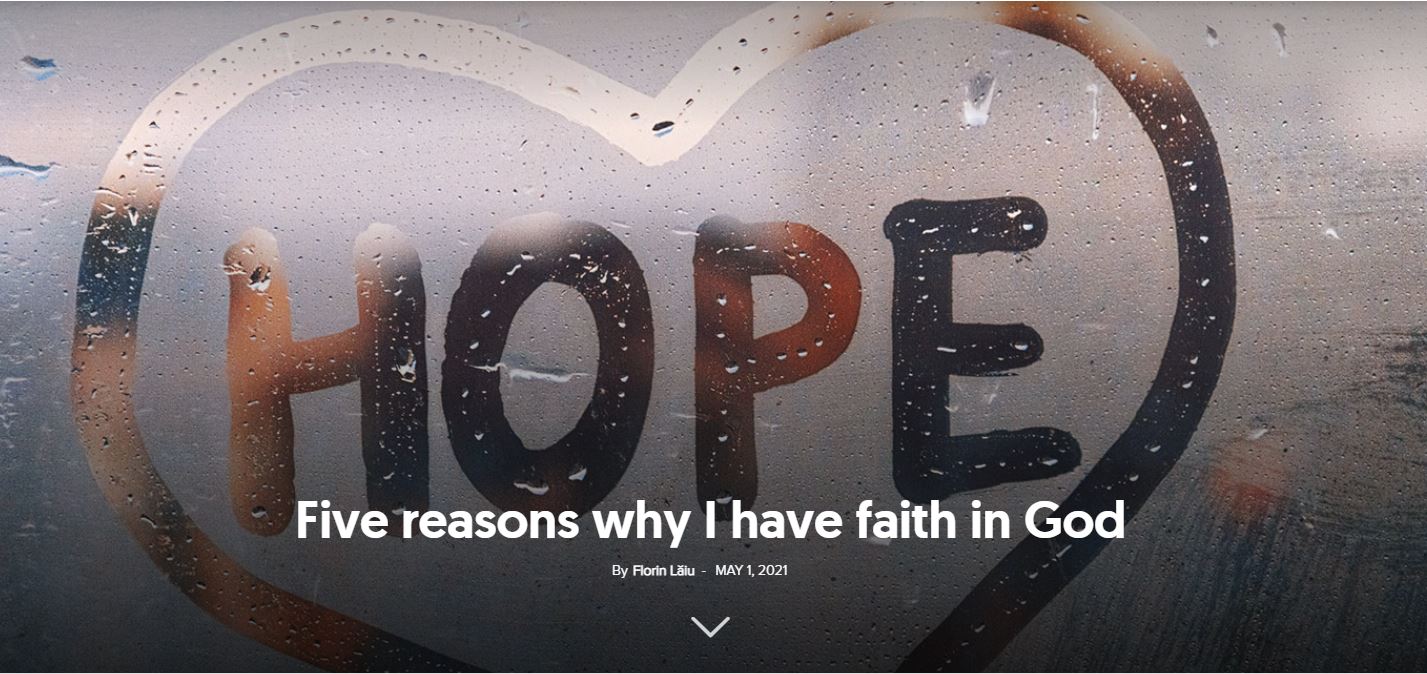Some statistics circulated by the international press have created an increasingly negative image of Christians and Christianity. How well-founded is this image, and how should those targeted by it deal with it?
The more intelligent we are, the less likely we are to believe in God, according to a recent meta-research that analysed the results of studies conducted over a period of almost a century. Coordinated by Miron Zuckerman, a psychologist at the University of Rochester, the research examined the results of 63 studies (the earliest dating back to 1920), all of which looked at the relationship between intelligence and religiosity. Most of these studies found that the more intelligent people were, the less likely they were to be religious. “The relation between intelligence and religion is negative,” Zuckerman said, telling the press that “it was very early in the study that [they] realised that.”
Christians in the spotlight
If the results of this study are not exactly a compliment to Christians, the information that follows is even less flattering. A report by the Pew Forum on Religion and Public Life shows that atheists score higher than Christians on Bible knowledge. In a 32-question survey on the specifics of Christianity, American atheists and agnostics answered an average of 20.9 of the 32 questions correctly. Jews averaged 20.5 correct answers and Mormons 20.3.
The more intelligent we are, the less likely we are to believe in God.
Protestants, on the other hand, answered an average of 17.6 questions correctly. The Pew Forum researchers also found that more educated people tend to be more knowledgeable about religion than less educated people. And while the Pew sociologists found a correlation between consistent reading of religious materials and knowledge about religion, atheists/agnostics scored higher than believers, even when education differences were removed.
According to other statistics, religious people tend to be poorer than atheists and tend to come from difficult backgrounds. For example, a 2011 Gallup poll of more than 150 countries around the world found that people in countries where living conditions are difficult are more likely to say they are religious. In developed countries, by contrast, people are much less interested in religion and say they are happy whether they follow a religion or not.
Christians today and reasons to be proud…
The Christianity reflected in these three secular studies is not one of which a Christian can be proud. Less intelligent, less educated, less financially successful—three elements that strike hard at the root of the contemporary Christian’s self-esteem. But our perspective depends crucially on how we interpret the survey data.
1. Religion “is for the poor”
Commenting on the survey results that correlate material well-being with lack of faith, author Ed Diener, a psychologist at the University of Illinois, noted that “circumstances predict religiousness. Difficult circumstances lead more strongly to people being religious. And in religious societies and in difficult circumstances, religious people are happier than nonreligious people. But in nonreligious societies or more benign societies where many people’s needs are met, religious people aren’t happier—everyone’s happier.”
In other words, yes, there is a higher concentration of religious people in poor countries than in rich ones, but the influence of society on faith is much more complex than it first appears.
In societies characterised by hardship and lower standards of living, people are more likely to turn to religion to find the resources to cope, and it will work.
Perhaps surprisingly, the difficulties of living in a particular society have a noticeable impact even on wealthy individuals, as another study published in 2011 showed. Specifically, in a society characterised by hardship, the rich are often more religious than the poor.
Last but not least, Ed Diener also points out that the influence of society is felt in another way: in religious societies, the non-religious are more unhappy, while in more secularised societies, the religious are more unhappy than the non-religious.
The above arguments force the honest observer to recognise the limits of an axiomatic “religion is for the poor” assessment. A society is more than its standard of living. How it can and does influence an individual’s religious experience is therefore a complex mechanism, the workings of which we do not even fully intuit. So caution is warranted: we know that society can shape an individual’s religious outlook, but we do not fully know how.
2. Religion “is for the uneducated”
Although the Pew survey showing that atheists outperform Christians in knowledge of Christianity seems to make a qualitative difference between Christians and atheists in favour of the atheists, in reality the statistic could be explained in another way. For example, some have suggested that atheists know more about Christianity than Christians, not because they are more intelligent or better educated, but because they are a minority who specialise in polemics.
Jamelle Bouie of The American Prospect believes that minorities such as atheists “tend to know more about the dominant group than vice versa.” Minorities have a natural motivation to learn more about the dominant group, especially if they expect to polemicise with them, says Matthew Nisbet of Big Think. In other words, because atheism is by definition a form of referential thinking (as opposed to theism), its characteristics are closely related to those of theism.
Poor countries have a higher concentration of religious people than rich countries.
Since the atheist movement has been formed mainly in Christian environments, and remains a minority in many of them, atheism has developed a militant anti-Christian side. In this context, says Daniel Larison of The American Conservative, many of those who argue that religion is a hoax become obsessed with the subject and spend a lot of time looking for arguments against religion. Typically, atheists pick out certain superficially known or understood details to mock Christians, Larison believes.
Moreover, the limitations of the claim that “religion is for the uneducated” overlap with the limitations of surveying a small sample of a WEIRD (Western, Educated, Industrialised, Rich and Democratic) society, such as the American setting in which the study was conducted. It would be a methodological error to extend the results of a local and temporary study to a generalising and permanent statement.
3. Religion “is for stupid people”
In the case of the research coordinated by Zuckerman, which found an inverse correlation between intelligence and religiosity, the debate is even more heated, but here too the perspective influences the interpretation significantly. The research coordinator himself offered a particular key to understanding its findings. The fact that the relationship between intelligence and belief is inversely proportional, he said, does not mean that only stupid people believe in God, but rather that intelligent people may have less of a “need” to believe in God.
“It is truly the wrong message to take from here that if I believe in God I must be stupid. I would not want to bet any money on that because I would have a very good chance of losing a lot of money,” Zuckerman said.
Instead, the study’s author said, smarter people may fulfil certain basic needs (or “functions” in psychological language) outside of religion. These functions include self-esteem, a sense of belonging to a community, and a sense of purpose. “We (the researchers, editor’s note) say it is possible that having a high level of intelligence provides similar functions to what religion provides.”
Like the aforementioned studies, Zuckerman’s study shows a correlation, but it doesn’t show what causes the pairings. And because each observer reads the study through the lens of his or her own subjectivism, it’s easy to see why some conclude that low intelligence is a source of religiosity. However, exceptions to this so-called rule legitimise and even necessitate the search for related causes involving other elements, such as those suggested by Lillian Daniel, a Congregational minister: “It’s not that intelligence leads to atheism, or education leads to loss of faith. But I think there is a certain peer pressure as one moves up the educational ladder to dismiss all religion as fundamentalism. It’s one of the last acceptable biases in an environment that prides itself on being open-minded,” Daniel concludes, as quoted by Religion News.
Christians building Christianity’s reputation
The scientific environment to which Daniel refers tends, at least apparently, to be under the influence of Nietzschean thought, which sees man on an evolutionary ladder towards the “superhuman” (Übermensch), and religion as an obstacle on that ladder. Ironically, history contradicted Nietzsche. It first contradicted him in his personal life (for although he “preached” the attributes of the vigorous, strong man, master of his instincts, and able to manage his freedom, Nietzsche himself was a slave to illness all his life).
History then contradicted him when the concept of the superhuman was absorbed by Nazi ideology, which interpreted his notion of the “will to power” in a barbaric way in order to legitimise totalitarian doctrine. In this way, Nietzsche’s “solid” philosophy, which fiercely defended human strength, became a fundamental pillar of an inhuman and dehumanising policy. This is why, although the concept of the Superman was so well developed and attractive that it won over the intellects of great thinkers such as Thomas Mann, André Gide, Sigmund Freud, Martin Heidegger and Emil Cioran, its application ended in unprecedented chaos: the Holocaust.
Yet there are few who deny Nietzsche’s intellectual merits or dispute his reasoning behind the superhuman. Moreover, his philosophy continues to resonate in contemporary rhetoric. Christianity, on the other hand, although it has dramatically shaped the culture of the last 2000 years, remains in many circles under the stigma of the horrors committed in the Middle Ages for political reasons under the guise of religion. Of course, no one can deny (or excuse) the cruelty of the Crusades, the Inquisition or, across the ocean, the Puritan fanaticism[1] or (today) the fundamentalism responsible for unspeakable horrors. But all these tragic snapshots of history fail, just as tragically, to represent the essence of Christianity.
A way out of the vicious circle
In the absence of an in-depth study of Christian morality, which would reveal principles that precede superficial interpretations that do not allow for alternatives, public opinion remains at the mercy of opinion-makers who are neither objective nor infallible. In analysing the above studies, however, an opinion-former who confuses correlation with causation is not just making an error that can be attributed to subjectivism, but is misinforming, if not manipulating.
It is unreasonable to observe simultaneity (the simultaneous presence of several characteristics in a group) and infer causality (to assume that one characteristic caused the other). This is because there are other interacting variables that make room for other scenarios, such as the vicious circle scenario. Specifically, it is plausible that as long as society educates its individuals in the spirit of self-sufficiency, they will not be open to a religion that preaches the opposite: dependence on God.[2]
Echoes of the Superhuman and other related philosophies of life teach that people must train themselves to face every challenge of life on their own. And this mentality is incompatible with Christianity, which speaks of man’s spiritual weakness, of his need for divine support to overcome his nature, which (if left unchecked) would lead him not to evolution but to regression.
It is a myth that education can be neutral, even from a religious point of view. Therefore, it is only natural that the mentality of today’s adults reflects the ideas and the spirit that were instilled in them in childhood and that shaped them as human beings. Today’s people do not want to hear the Christian narrative because, having been taught to feel self-sufficient, they no longer feel the need for a God. In these circumstances it is manipulative to claim that the lack of need for God among the educated is proof that only the uneducated can believe.
If society were educated in the spirit of the Gospel, intelligent people would still believe today, just as they did at the time of the Protestant Reformation, whose leaders were clearly highly intelligent intellectuals.
Taking stock of an old issue
It is also worth noting that the Bible is no stranger to the statistics of the religious present. Jesus Christ himself said that “it is easier for a camel to go through the eye of a needle than for a rich man to enter the kingdom of God” and that “blessed are the poor in spirit, for theirs is the kingdom of heaven.” The people who see their shortcomings are the ones who feel they need God. It’s a matter of perspective.
Such a perspective gives way to remarkable exceptions of atheist intellectuals from the secular elite who convert to Christianity. Jordan Monge, regional director of the association Veritas Forum, for example, converted while studying at Harvard. Authentic religion finds its way into people’s hearts and minds despite their anti-religious upbringing. This is because people have a choice when God responds to a need they face. And that choice does not depend on IQ, but on a willingness to recognise one’s vulnerability.
A study showing that many intelligent people choose not to believe does not speak to the essence of Christianity because, as its author Zuckerman points out, the purpose of the study is only to see to what extent intelligent people are found among believers. In the end, it makes little difference whether there are more poor and uneducated people among Christians. If we look at the way in which Christianity has refined the existence of people who are considered “unpromising” by secular standards, we see its value reflected.
We see a religion that can really change the lives of such people for the better. And that would be another argument in favour of its quality. Let’s not forget: what our society is today is the result of a Christianity propagated by people who are not necessarily rich, not necessarily educated and not necessarily intellectually brilliant. History has shown the capacity of Christianity to produce great results (individually and collectively) and has also shown that it does not necessarily need gifted individuals to do so, although they have existed and exist among Christians.




















